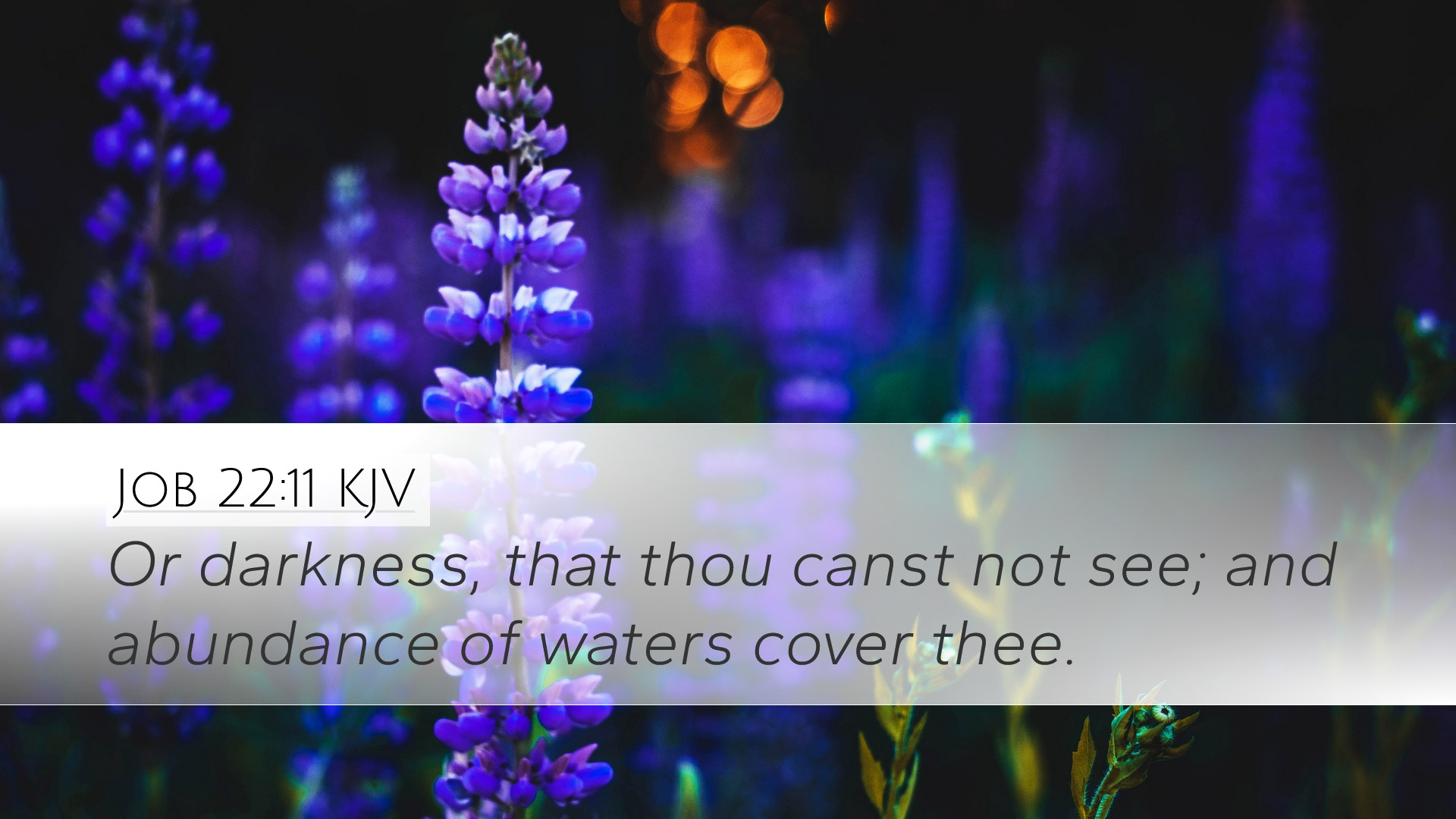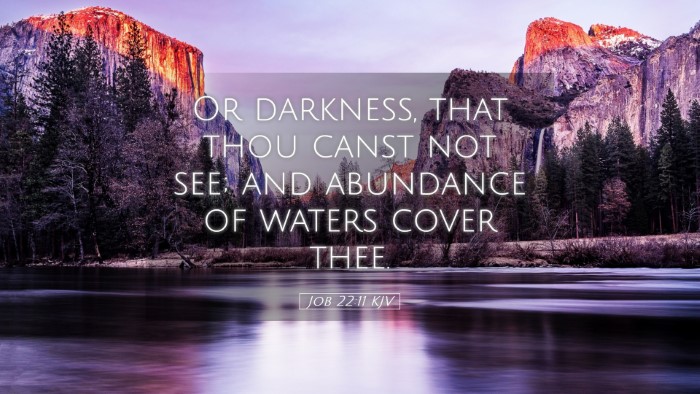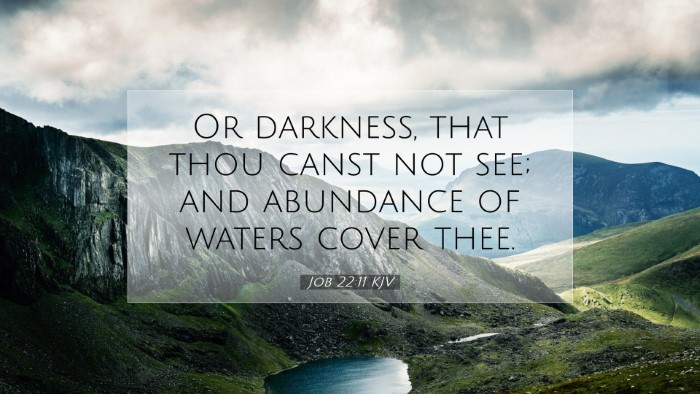Old Testament
Genesis Exodus Leviticus Numbers Deuteronomy Joshua Judges Ruth 1 Samuel 2 Samuel 1 Kings 2 Kings 1 Chronicles 2 Chronicles Ezra Nehemiah Esther Job Psalms Proverbs Ecclesiastes Song of Solomon Isaiah Jeremiah Lamentations Ezekiel Daniel Hosea Joel Amos Obadiah Jonah Micah Nahum Habakkuk Zephaniah Haggai Zechariah MalachiJob 22:11
Job 22:11 KJV
Or darkness, that thou canst not see; and abundance of waters cover thee.
Job 22:11 Bible Commentary
Commentary on Job 22:11
Job 22:11 states:
"Or darkness, that you cannot see; and an abundance of waters covers you."
Introduction
Job 22:11 presents a vivid image of darkness and overwhelming waters, suggesting a metaphorical blindness to God's presence and the resulting spiritual desolation. This passage, embedded in one of the dialogues between Job and his friends, invites a deep examination of its theological implications and practical applications in the lives of believers. The interpretation of this verse is critically shaped by insights from renowned public domain commentators including Matthew Henry, Albert Barnes, and Adam Clarke.
Contextual Background
In the Book of Job, the narrative centers on the suffering of Job and the responses of his friends who try to rationalize his misfortunes. By the time we reach chapter 22, Eliphaz, one of Job's friends, engages in a polemical discourse aimed at Job’s integrity. He asserts that Job's sufferings are a direct consequence of sin, which is foundational to the arguments presented in this verse.
Exegesis of Job 22:11
In the passage, the terms "darkness" and "abundance of waters" serve as crucial symbols. Darkness indicates an absence of understanding or enlightenment, while the "abundance of waters" suggests overwhelming trouble or judgment. Each commentator provides distinct insights into these metaphors.
Matthew Henry's Commentary
Henry emphasizes the vivid imagery of darkness and its theological implications with a pastoral eye. He observes:
- Spiritual Blindness: Henry writes about the perilous condition of being blind to God's workings, suggesting that such blindness often arises from pride and unrepentant sin.
- Divine Judgment: The mention of "abundance of waters" reflects the notion that God’s judgments can be overwhelming, possibly hinting at the flood imagery associated with divine retribution.
- Call to Repentance: Henry reflects that the purpose of Eliphaz's words, although misapplied, is a hopeful reminder that repentance can bring one back to enlightenment.
Albert Barnes' Notes
Barnes adds a scholarly perspective on this passage, elucidating on the significance of the phrases used:
- The Nature of Darkness: He explores how darkness often signifies ignorance and separation from God, underscoring that those who live in sin cannot perceive God’s presence nor His works.
- Symbolism of Waters: Barnes interprets the imagery of waters as not only representing turmoil but as a metaphor for God’s protective or destructive power. He notes that waters can either cleanse or drown, much like the experiences of God’s judgment in the believer's life.
- Human Condition: He highlights the universal human condition of being overwhelmed by woes, encouraging readers to seek the light of God's truth in the midst of despair.
Adam Clarke's Commentary
Clarke furnishes a unique lens through which to view this passage, focusing on the nature of man in relation to God:
- God's Hiddenness: Clarke posits that the phrase “cannot see” reflects the spiritual blindness that comes from sin, suggesting that such blindness can lead to one's own destruction.
- Living in Fear: He believes the abundance of waters represents not only judgment but also the overwhelming fear that can engulf a person who believes they are distanced from God.
- Hope in Despair: Clarke concludes with a meaningful reassurance that even in darkness and floods, God can illuminate and rescue the soul that seeks Him in sincerity.
Theological Implications
This verse transcends its immediate context to touch on broader theological themes relevant to the lives of Christians today. It encourages profound reflection on:
- The Nature of Sin: Each commentary stresses that sin blinds humanity from understanding not just God's character, but also the nuances of one's own heart.
- The Response to Suffering: Job's plight allows for contemplation on how suffering is often perceived as punitive. This passage challenges that view, suggesting a different lens through which to perceive adversity.
- God’s Sovereignty: The overwhelming waters illustrate God’s authority over creation, leading to discussion on whether such experiences drive individuals away from God or bring them closer.
Practical Application
The relevance of Job 22:11 extends to pastoral care and personal spirituality:
- Discernment in Suffering: Pastors and leaders are called to guide congregants in recognizing their circumstances as opportunities to seek God's light.
- Encouragement for the Weary: Believers are reminded that even in overwhelming situations, turning to God can restore sight and clarity.
- Call to Community: It is crucial for communities to support one another through “dark waters,” highlighting the importance of confession, accountability, and mutual encouragement.
Conclusion
In conclusion, Job 22:11 serves as a profound reminder that spiritual darkness and overwhelming troubles may cloud one’s perspective of God. However, through the lens of the commentaries of Henry, Barnes, and Clarke, we are provided with the hope of God’s imminent presence, capable of dispelling darkness and lifting burdens. Thus, the call to examine our own hearts, to seek repentance, and to rely on God's sovereign grace stands as a timeless application of these ancient words.


